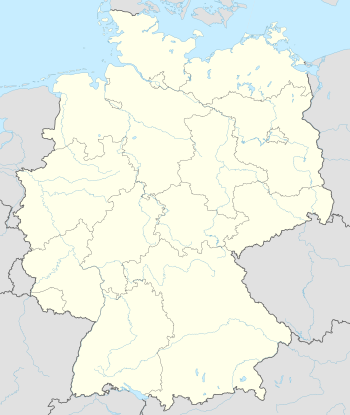Frauen-Bundesliga
 | |
| Founded | 1990 |
|---|---|
| Country | Germany |
| Confederation | UEFA |
| Number of teams | 12 |
| Level on pyramid | 1 |
| Relegation to | 2. Frauen-Bundesliga |
| Domestic cup(s) | DFB-Pokal DFB-Supercup Frauen |
| International cup(s) | Champions League |
| Current champions | Bayern Munich (6th title) (2023–24) |
| Most championships | 1. FFC Frankfurt/Eintracht Frankfurt VfL Wolfsburg (7 titles each) |
| TV partners | DAZN Magenta Sport |
| Website | www |
| Current: 2024–25 Frauen-Bundesliga | |
The Frauen-Bundesliga (German for Women's Federal League), currently known as the Google Pixel Frauen-Bundesliga for sponsorship reasons, is the top level of league competition for women's association football in Germany.
In the UEFA Women's Champions League, the Frauen-Bundesliga is the most successful league with a total of nine titles from four clubs.
In 1990 the German Football Association (DFB) created the German Women's Bundesliga, based on the model of the men's Bundesliga.[1][2] It was first played with north and south divisions, but in 1997 the groups were merged to form a uniform league. The league currently consists of twelve teams and the seasons usually last from late summer to the end of spring with a break in the winter. Despite the league's competitiveness, it has been semi-professional.[3][4][5] VfL Wolfsburg has won the most championships.[6] Although the league has become more professional, women's-only teams have found it difficult to support themselves without corporate financial backing.[7][8]
Competition format
[edit]The Bundesliga consists of twelve teams.[9] At the end of a season, the club in the top spot is the champion, gaining the title of Deutscher Meister, and the clubs finishing 11th and 12th are replaced with the respective top-placed teams of the two 2. Frauen-Bundesliga divisions. A Bundesliga season consists of two rounds, with 22 games combined. In a round every club plays against each other, having a home game against a specific club in one round and an away game in the other. The seasons typically start in August or September, with the first round finishing in December. The second round typically starts in February and ends in May or June, though sometimes the first games of the second round are held in December. In World Cup years, the league might alter its schedule to accommodate the tournament.
The Bundesliga ranking is determined by points a club has gained during a season. A win is worth 3 points, a draw 1, and a loss 0. The tiebreakers are in descending order goal difference, goals for, and head-to-head results. If the tie in the league table cannot be broken, a tie-breaking game is held.
In June 2024, the DFB announced that from the 2025–26 season on, it will be played with 14 teams.[10]
Clubs
[edit]2023–24 season
[edit]| Team | Home city | Home ground | Capacity |
|---|---|---|---|
| Werder Bremen | Bremen | Weserstadion Platz 11 | 5,500 |
| MSV Duisburg | Duisburg | PCC-Stadion | 3,000 |
| SGS Essen | Essen | Stadion Essen | 20,650 |
| Eintracht Frankfurt | Frankfurt | Stadion am Brentanobad | 5,650 |
| SC Freiburg | Freiburg | Dreisamstadion | 24,000 |
| TSG Hoffenheim | Hoffenheim | Dietmar-Hopp-Stadion | 6,350 |
| 1. FC Köln | Cologne | Franz-Kremer-Stadion | 5,457 |
| RB Leipzig | Leipzig | Sportanlage Gontardweg | 1,300 |
| Bayer Leverkusen | Leverkusen | Ulrich-Haberland-Stadion | 3,200 |
| Bayern Munich | Munich | FC Bayern Campus | 2,500 |
| 1. FC Nürnberg | Nuremberg | Max-Morlock-Stadion | 50,000 |
| VfL Wolfsburg | Wolfsburg | AOK Stadium | 5,200 |
Champions
[edit]| Season | Champions | Runners-up |
|---|---|---|
| 1990–91 | TSV Siegen | FSV Frankfurt |
| 1991–92 | TSV Siegen | Grün-Weiß Brauweiler |
| 1992–93 | TuS Niederkirchen | TSV Siegen |
| 1993–94 | TSV Siegen | Grün-Weiß Brauweiler |
| 1994–95 | FSV Frankfurt | Grün-Weiß Brauweiler |
| 1995–96 | TSV Siegen | SG Praunheim |
| 1996–97 | Grün-Weiß Brauweiler | FC Rumeln-Kaldenhausen |
| 1997–98 | FSV Frankfurt | SG Praunheim |
| 1998–99 | 1. FFC Frankfurt | FCR Duisburg |
| 1999–00 | FCR Duisburg | 1. FFC Frankfurt |
| 2000–01 | 1. FFC Frankfurt | 1. FFC Turbine Potsdam |
| 2001–02 | 1. FFC Frankfurt | 1. FFC Turbine Potsdam |
| 2002–03 | 1. FFC Frankfurt | 1. FFC Turbine Potsdam |
| 2003–04 | 1. FFC Turbine Potsdam | 1. FFC Frankfurt |
| 2004–05 | 1. FFC Frankfurt | FCR Duisburg |
| 2005–06 | 1. FFC Turbine Potsdam | FCR Duisburg |
| 2006–07 | 1. FFC Frankfurt | FCR Duisburg |
| 2007–08 | 1. FFC Frankfurt | FCR Duisburg |
| 2008–09 | 1. FFC Turbine Potsdam | Bayern Munich |
| 2009–10 | 1. FFC Turbine Potsdam | FCR Duisburg |
| 2010–11 | 1. FFC Turbine Potsdam | 1. FFC Frankfurt |
| 2011–12 | 1. FFC Turbine Potsdam | VfL Wolfsburg |
| 2012–13 | VfL Wolfsburg | 1. FFC Turbine Potsdam |
| 2013–14 | VfL Wolfsburg | 1. FFC Frankfurt |
| 2014–15 | Bayern Munich | VfL Wolfsburg |
| 2015–16 | Bayern Munich | VfL Wolfsburg |
| 2016–17 | VfL Wolfsburg | Bayern Munich |
| 2017–18 | VfL Wolfsburg | Bayern Munich |
| 2018–19 | VfL Wolfsburg | Bayern Munich |
| 2019–20 | VfL Wolfsburg | Bayern Munich |
| 2020–21 | Bayern Munich | VfL Wolfsburg |
| 2021–22 | VfL Wolfsburg | Bayern Munich |
| 2022–23 | Bayern Munich | VfL Wolfsburg |
| 2023–24 | Bayern Munich | VfL Wolfsburg |
Wins by club
[edit]| Club | Titles | Runner-up |
|---|---|---|
| 1. FFC Frankfurt | 7 | 6[n 1] |
| VfL Wolfsburg | 7 | 6 |
| 1. FFC Turbine Potsdam | 6 | 4 |
| Bayern Munich | 5 | 6 |
| TSV Siegen | 4 | 1 |
| FSV Frankfurt | 2 | 1 |
| FCR Duisburg | 1 | 7[n 2] |
| Grün-Weiß Brauweiler | 1 | 3 |
| TuS Niederkirchen | 1 | 0 |
International competitions
[edit]Each season's champion as well as the second-place finisher qualifies for the next season's UEFA Women's Champions League.
Starting with the 2021–22 edition, as determined by the UEFA women's coefficient, the top three teams will qualify for the UEFA Women's Champions League.
Broadcasting
[edit]2023/24 until 2026/27
[edit]| Country/Region | Broadcaster |
|---|---|
| Magenta Sport | |
| Baltics | Viaplay Group |
| Netherlands | |
| Nordics | |
| Poland | |
| Brazil | DAZN[11] |
| Canada | |
| EuropeEUR | |
| Japan | |
| Central America | Sky Sports[12] |
| Worldwide (unsold markets) | DFB Play |
EUR - Frauen-Bundesliga on DAZN coverage is not available in Denmark, Estonia, Finland, Iceland,Latvia, Lithuania, the Netherlands, Norway, Poland, and Sweden
See also
[edit]- List of German women's football champions
- DFB-Pokal (women)
- Women's sports
- List of foreign Frauen-Bundesliga players
References
[edit]- ^ "World Cup: German pro league brings success". ESPN.com. 18 June 2011.
- ^ "ZEIT ONLINE | Lesen Sie zeit.de mit Werbung oder im PUR-Abo. Sie haben die Wahl". www.zeit.de.
- ^ "Frauen-Bundesliga endlich mehr im Fokus? | DW | 14.09.2022". DW.COM.
- ^ "Meinung: Quantensprung für Frauenfußball? Da geht noch mehr! | DW | 13.10.2022". DW.COM.
- ^ Göbel, Jan (16 September 2022). "Fußball-Bundesliga der Frauen beginnt: Was bleibt vom EM-Hype?". Der Spiegel – via www.spiegel.de.
- ^ "Frauenfußball-Bundesliga: VfL Wolfsburg holt Meistertitel". www.zdf.de. 8 May 2022.
- ^ "Das Los der SGS Essen: "Man merkt, dass die Lizenzklubs immer mehr auffahren"". kicker.
- ^ "Corona-Krise: Frauenfußball im Schatten der Konzern-Klubs".
- ^ "Namensgeber: Allianz sponsert Frauen-Bundesliga". www.fr.de. 10 April 2014.
- ^ "Google Pixel Frauen-Bundesliga ab der Saison 2025/2026 mit 14 Teams". DFB.de (in German). German Football Association. 23 June 2024. Retrieved 23 June 2024.
- ^ She Kicks Magazine (7 June 2023). "DAZN ACQUIRES BROADCASTING RIGHTS TO THE FRAUEN-BUNDESLIGA". OneFootball.
- ^ Lingeswaran, Susan (15 September 2023). "DFB nets four major broadcasters for Frauen-Bundesliga". Sportcal. Retrieved 9 October 2023.

